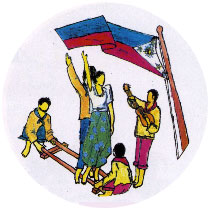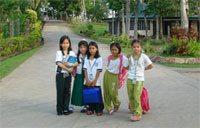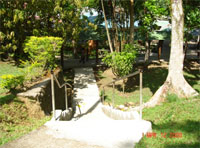September 24, 2018
Mercy Day

By Sr. Carmela Cabactulan

God has created a paradise for His people. He has given us this earth where all things essential to life and needed to sustain life are present.
This paradise which we call mother earth is entrusted to us by the Creator- for us to take care of, not to destroy. But what are we doing to this paradise?
Our earth is in peril. It is dying! One does not need to be an expert to see what is happening to be profoundly troubled by this catastrophe. One does not need statistics to be convinced that our environment is severely threatened. We experience it everyday and it is becoming worse - constantly increasing temperature of the atmosphere, stronger typhoons, more floods and landslides, rising of water levels and disappearance of islands, among others. Many life forms are becoming extinct, and the main culprit is “global warming.”
The Catholic Bishops Conference of the Philippines in its January
1988 pastoral letter stated:
“Within a few short years brown eroded hills have replaced luxuriant forests in many parts of the country. We see dried-up riverbeds where, not so long ago, streams flowed throughout the year.”
The attack on the natural world is rapidly whittling away at the very base of our living world and endangering its fruitfulness for future generations. The CBCP letter concluded that
“…we reap what we sow; the results of our attitudes and activities are predictable and deadly… thus, there is urgency about this issue which calls for widespread education and immediate action.”
Sr. Luz Emmanuel Soriano, encouraged each of us to act
“With mother earth dying with each passing day, we can no longer wait for the appropriate values and behavior to evolve naturally in people.
We cannot afford to wait for the symptoms of an irreversible death to manifest themselves in our endangered world.”
She further recommended that an agent must come in to speed up the process of change and to spark a revolution in people’s hearts. That agent, she says is the school, along with members of the school community.
Likewise, Pope John Paul II in his message during the World Day of Peace on January 1, 1990 said:
“An education in ecological responsibility is urgent: responsibility for oneself, for others, and for the earth… Churches and religious bodies, nongovernmental and governmental organizations, indeed all members of the society, have a precise role to play in such education.
The first educator however, is the family, where the child learns to respect his neighbors and to love nature.”
 |
| Holy Infant College |
This is a challenge that Holy Infant College is seeking to address.
As a school, specifically as a Catholic Institution, it has its obligation to protect the gift God has given us- the Earth. Thus, in its vision, it clearly stipulates:
“Holy Infant College is a community of persons committed to excellence in education and integral formation of all learners in an environment of Christian Faith, compassionate love, justice and peace, and integrity of creation –towards responsible stewardship in the Church and Philippine society.”
The vision underscores, among others, the integrity of creation, which specifically includes the value of love for the environment and specific reminders to :
Basic Policies of the Programme:
 |
| Pupils of Holy Infant College |
Objectives:
The main objective of the program is to involve every member of the school community, including the parents and the alumni, in several activities that will be launched through formation of Environment Organizations, integration of environmental education in the curriculum and other related activities.
Components of the Environment Program:
 |
| Grounds of Holy Infant College |